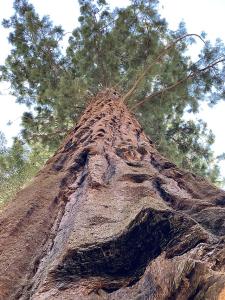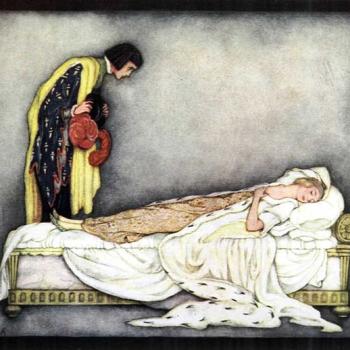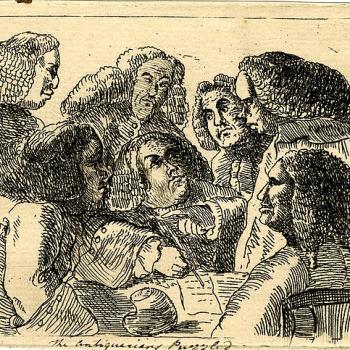 Imagine you and a friend are hiking through a large Northern California forest, and the two of you are immersed in a deeply-involving discussion of philosophy. Lost to your surroundings, you both stop for a moment, face each other, and expound your points enthusiastically. You put an exclamation mark on your last sentence and turn around. You walk smack into the largest, tallest Redwood tree on earth. You look up: the monster tree looms like a skyscraper and is wider than a living-room. You fall back in a mixture of instant irrational dread and awe. You are overpowered and – for a lingering moment – gut-wrenchingly scared.
Imagine you and a friend are hiking through a large Northern California forest, and the two of you are immersed in a deeply-involving discussion of philosophy. Lost to your surroundings, you both stop for a moment, face each other, and expound your points enthusiastically. You put an exclamation mark on your last sentence and turn around. You walk smack into the largest, tallest Redwood tree on earth. You look up: the monster tree looms like a skyscraper and is wider than a living-room. You fall back in a mixture of instant irrational dread and awe. You are overpowered and – for a lingering moment – gut-wrenchingly scared.
That sensation, if prolonged and rarefied – call it “a sustained spiritual state” – is pretty much what Christians mean when they speak of “the fear of the Lord”. To fear is to revere, as it were. But at the same time it’s necessary to add to your awe of God’s majesty, a sense of His overwhelming might – an awareness of His power to crush into dust an entire planet, if He so chooses. A Redwood tree is not going to strike you down unless it accidentally falls on you; it has no real power of volition. But God always has you in His sights, and His lightning-fast mobility and reach are – viewed in their totality – terrifying.
Fear of God means, in one of its root definitions, taking God very, very seriously – knowing at all times that Father is not to be toyed with, or inveigled, or condescended to, or seduced, or made the object of dissimulation. He decides the rules of the game, and He is the judge and referee and Board of Reprieve and executioner. All roads lead back to Him, and no one is not dragged before His tribunal. Before we can talk about God’s mercy and love and compassion, we must first bow down before His unimaginably “strong right arm”, which can not only unmake us in an instant, but also inflict an eternity of suffering without so much as a glance in our direction.
Okay. Once we have firmly established in our minds the Lord’s universal immensity of strength (as well as His ferocious demand for absolute justice), we can then proceed to other considerations. After all, “the fear of the Lord is the beginning of wisdom”. Not the end-all and be-all, not the whole point of wisdom, but only the starting-point. We learn later in Scripture that “perfect love casteth out fear” (1 John 4:18). So we begin in fear, and we end in love (fear of the sort described above, and love as it is perfected by grace). Just as humanity began in a garden and ends up (in the New Jerusalem) in a city, so each one of us – if we are of His invisible Body – treads the path that leads from genuflecting before God’s leonine might, to relaxing under His mother hen’s wings.
In our day and age, the fear of God is downplayed and minimized as much as possible. But in Matthew 10:28 we read: “be afraid of the one who can destroy both soul and body in hell”. Who is that? The only one who can do such a thing is God the loving Father. It is good to remember that. It is good to begin our everlasting adventure with the Creator by fixing in our minds the fact of His sheer brawn, and that nothing is more dangerous than His disapprobation. After that, we may sleep soundly in His protecting arms.













